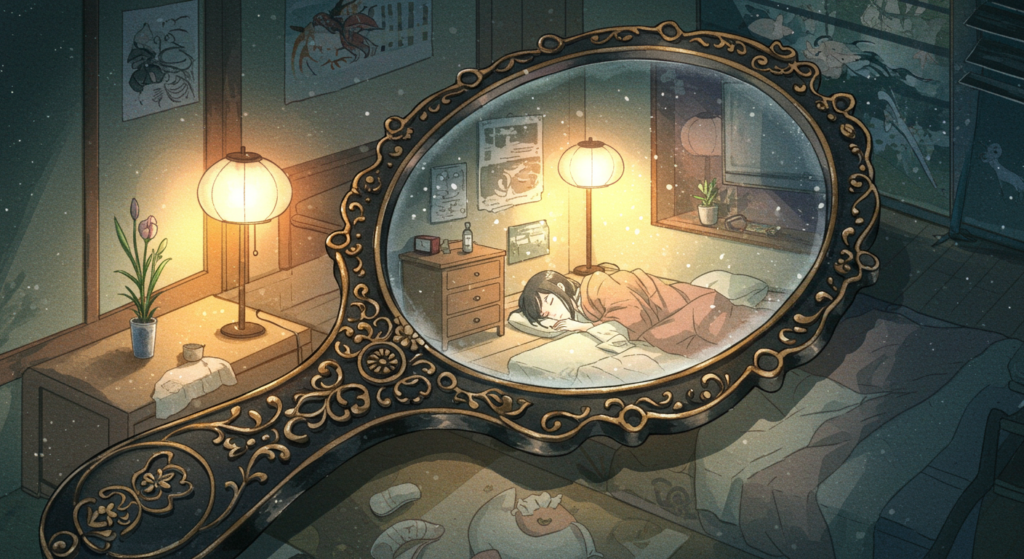The doorbell rings.
“That must be×意味:
きっと~に違いない。
何かについて非常に確信している時に使う表現。
文法:
- 'must be' は推量を表す英語の助動詞句です。
- 'that' は文脈によって指すものが変わりますが、ここでは「メイが来る」という状況を指しています。
例:
That must be John at the door.
ドアにいるのはきっとジョンに違いない。
She hasn't replied yet, that must be because she is busy.
彼女はまだ返信していません、きっと忙しいからでしょう。 Mei. Right on time×意味:
ちょうど時間通り。
予定された時間や期待された時間に正確に合っていること。
文法:
- 'right' はここでは「まさに」「正確に」という意味で、'on time' を強調しています。
- 'on time' は「時間通りに」という意味の副詞句です。
例:
The train arrived right on time.
電車は時間通りに到着しました。
She is always right on time for meetings.
彼女はいつも会議に時間通りに来ます。,” Mom says. She gives Amelia a schoolbag. “Have a good day at school!”
Amelia and Mei start walking to school.
“Yuhi and I had another big fight×意味:
また大喧嘩。
以前にも喧嘩をしたことがあり、今回もまた大きな喧嘩をしたという意味。
文法:
- 'another' は「もう一つの」「別の」という意味の形容詞です。
- 'big fight' は「大きな喧嘩」「激しい口論」という意味の名詞句です。
例:
They had another big fight last night.
彼らは昨夜また大喧嘩をしました。
This is another big fight about money.
これはまたお金に関する大きな喧嘩です。 last night,” Mei says. “I was so angry that×意味:
私はとても怒っていたので。
非常に強い感情が原因で、その後に続く結果や出来事が起こったことを示す表現。
文法:
- 'so angry that' は原因と結果の関係を表す英語の構文です。
- 'so angry' が原因、'that' 以下が結果を表します。
例:
I was so tired that I fell asleep immediately.
私はとても疲れていたので、すぐに眠ってしまいました。
He was so happy that he started to sing.
彼はとても嬉しかったので、歌い始めました。 I had nightmares×意味:
悪夢を見た。
寝ている間に見る、非常に不快で恐ろしい夢を見るという意味。
文法:
- 'nightmare' は「悪夢」という意味の名詞です。
- 'have nightmares' は「悪夢を見る」という動詞句です。
例:
She had nightmares after watching the horror movie.
彼女はホラー映画を見た後、悪夢を見ました。
The child often has nightmares in the dark.
その子供は暗闇の中でよく悪夢を見ます。 all night×意味:
一晩中。
夜の間ずっと、夜の初めから終わりまでという意味。
文法:
- 'all night' は「一晩中」という意味の副詞句です。
- 時間の継続を表します。
例:
It rained all night.
一晩中雨が降りました。
He studied all night for the exam.
彼は試験のために一晩中勉強しました。. You were in my dream×意味:
あなたは私の夢に出てきた。
睡眠中に見た夢の中に、特定の人が現れたことを伝える表現。
文法:
- 'You were in my dream' は過去の出来事を表す文です。
- 'in my dream' は場所を示す前置詞句で、夢の中という状況を表します。
例:
My old friend was in my dream last night.
昨夜、私の古い友達が夢に出てきました。
He often appears in my dreams.
彼はよく私の夢に出てきます。 too, Hana.”
“If you and Yuhi fight all the time×意味:
いつも。
常に、絶え間なく、という意味で、非常に頻繁に繰り返される状態を表します。
文法:
- 'all the time' は「いつも」「常に」という意味の副詞句です。
- 頻度や継続性を強調します。
例:
They argue all the time.
彼らはいつも言い争っています。
She is late all the time.
彼女はいつも遅刻します。,” Amelia says, “why don’t you×意味:
~したらどうですか。
相手に何かを提案したり、アドバイスをする際に使う表現。
文法:
- 'why don't you' は提案や軽いアドバイスをするための英語の疑問文の形です。
- 相手の行動を促すニュアンスがあります。
例:
Why don't you take a break?
休憩したらどうですか?
Why don't you ask him for help?
彼に助けを求めたらどうですか? break up with×意味:
~と別れる。
恋人やパートナーとの関係を終わらせるという意味。
文法:
- 'break up with' は句動詞で、「~と別れる」という意味を表します。
- 'break up' は関係の終了、'with' は別れる相手を示します。
例:
She broke up with her boyfriend.
彼女は彼氏と別れました。
They decided to break up.
彼らは別れることにしました。 him and find another×意味:
別の~を見つける。
現在のものではなく、異なる何かを探す、または見つけることを提案する表現。
文法:
- 'find another' は「別のものを見つける」という意味の動詞句です。
- 'another' は「別の」「もう一つの」という意味で、ここではボーイフレンドを指します。
例:
If you don't like this shirt, find another one.
もしこのシャツが好きでなければ、別のものを見つけてください。
I need to find another job.
私は別の仕事を見つける必要があります。 boyfriend?”
Mei stops walking. She looks at Hana carefully×意味:
注意深く。
細部に注意を払い、何かをよく観察する様子を表す副詞。
文法:
- 'carefully' は副詞で、動詞 'looks' を修飾しています。
- 行動のやり方、ここでは「見る」様子が注意深いことを示します。
例:
Drive carefully.
注意深く運転してください。
Listen carefully.
注意深く聞いてください。. “Yuhi isn’t my boyfriend. He’s my brother! You’re not Hana. Hana knows that Yuhi is my brother×意味:
ハナはユウヒが私の兄弟だと知っている。
相手が事実を知っているはずだと述べる表現。
文法:
- 'Hana knows that Yuhi is my brother' は、ハナが特定の事実を認識しているという文です。
- 'knows that' は目的語となる節を導きます。
例:
I know that you are tired.
私はあなたが疲れていることを知っています。
She knows that he is lying.
彼女は彼が嘘をついていることを知っています。. Who are you?”
Amelia feels scared×意味:
怖いと感じる。
恐怖や不安の感情を経験している状態を表す表現。
文法:
- 'feel scared' は感情を表す一般的な英語のフレーズです。
- 'feels' は動詞 'feel' の三人称単数現在形、'scared' は形容詞で「怖がっている」という意味です。
例:
He feels scared in the dark.
彼は暗闇で怖いと感じます。
She feels scared when she is alone.
彼女は一人でいると怖いと感じます。. “You’re right.×意味:
あなたの言う通りです。
相手の言っていることが正しいと認める時に使う表現。
文法:
- 'You're right' は相手に同意する際の決まり文句です。
- 'right' は形容詞で「正しい」という意味です。
例:
You're right, we should leave now.
あなたの言う通りです、私たちは今出発すべきです。
You're right about the weather, it's going to rain.
天気についてあなたの言う通りです、雨が降りそうです。 I’m not Hana. My name is Amelia. I’m from Australia. I woke up in Hana’s body. I don’t know why.×意味:
なぜだか分からない。
理由や原因が自分には理解できない、または説明できない時に使う表現。
文法:
- 'I don't know why' は理由が不明であることを示す英語のフレーズです。
- 'don't know' は知らないこと、'why' は理由を尋ねる疑問詞ですが、ここでは理由が不明であることを示します。
例:
I don't know why she is angry.
彼女がなぜ怒っているのか分かりません。
I don't know why this happened.
なぜこうなったのか分かりません。“
“Oh! That’s why…×意味:
ああ!それで…。
何かが理解できた時や、理由が分かった時に使う感嘆詞的な表現。
文法:
- 'Oh! That's why…' は、直前の会話や状況から何かの理由や原因を理解したことを示すフレーズです。
- 'That's why' は「そういうわけで」「だから~だ」という意味です。
例:
Oh! That's why you were late.
ああ!それであなたが遅れたのですね。
Oh! That's why she is so happy.
ああ!それで彼女はとても幸せなのですね。” Mei’s eyes get big×意味:
大きくなる。
目の大きさが物理的に増す、または驚きや感情で目が大きく見えるようになること。
文法:
- 'get big' は変化を表す英語の表現で、「大きくなる」という意味です。
- 'get' はここでは「~になる」という意味の動詞として使われています。
例:
His eyes get big when he is surprised.
彼は驚いたとき、目が大きくなります。
The company is getting big quickly.
その会社は急速に大きくなっています。. “I had a strange dream about×意味:
~についての奇妙な夢を見た。
特定の内容を含む、普通ではない、または不思議な夢を見たことを伝える表現。
文法:
- 'I had a strange dream about' は過去の夢について語る際の表現です。
- 'strange dream' は「奇妙な夢」「不思議な夢」という意味の名詞句で、'about' の後に夢の内容が続きます。
例:
I had a strange dream about flying.
私は空を飛ぶ奇妙な夢を見ました。
She had a strange dream about her old school.
彼女は古い学校についての奇妙な夢を見ました。 Hana last night!”
“What did you see?” Amelia asks.




“In my dream, I saw a cave×意味:
洞窟を見た。
地中にできた空洞や穴を視覚的に認識したという意味。
文法:
- 'I saw a cave' は過去の出来事を表すシンプルな文構造です。
- 'cave' は「洞窟」という意味の名詞です。
例:
We saw a cave on the mountain.
私たちは山で洞窟を見ました。
He saw a cave in the distance.
彼は遠くに洞窟を見ました。. There were drawings×意味:
絵。
線や色を使って表面に何かを描いたもの、ここでは壁に描かれたものを指す。
文法:
- 'drawings' は 'drawing' の複数形で、「絵」「図面」という意味の名詞です。
- ここでは洞窟の壁に描かれた絵を指します。
例:
The children made drawings in class.
子供たちは授業で絵を描きました。
These are beautiful drawings of animals.
これらは動物の美しい絵です。 of strange animals×意味:
奇妙な動物。
普通ではない、珍しい、または理解しにくい動物のこと。
文法:
- 'strange animals' は形容詞 'strange' と名詞 'animals' からなる名詞句です。
- 'strange' は「奇妙な」「不思議な」という意味で、'animals' を修飾しています。
例:
They saw strange animals at the zoo.
彼らは動物園で奇妙な動物を見ました。
In the dream, there were strange animals.
夢の中には奇妙な動物がいました。 on the walls×意味:
壁に。
壁の表面または壁に取り付けられている状態を指す前置詞句。
文法:
- 'on the walls' は場所を示す前置詞句です。
- 'on' は接触を表し、'walls' は壁の複数形です。
例:
There are pictures on the walls.
壁には絵が飾ってあります。
The paintings were on the walls of the cave.
絵は洞窟の壁に描かれていました。. An Australian man and a Japanese woman were there. The man had a crystal ball×意味:
水晶玉。
水晶で作られた球体で、占いなどに使われる道具。
文法:
- 'crystal ball' は複合名詞で、「水晶玉」という意味です。
- 'crystal' は「水晶」、'ball' は「球」を意味します。
例:
The fortune teller looked into a crystal ball.
占い師は水晶玉を覗き込みました。
She has a crystal ball on her desk.
彼女は机の上に水晶玉を置いています。 and the woman had a magic mirror×意味:
魔法の鏡。
魔法の力を持つとされる鏡、物語やファンタジーによく登場するアイテム。
文法:
- 'magic mirror' は複合名詞で、「魔法の鏡」という意味です。
- 'magic' は「魔法の」、'mirror' は「鏡」を意味します。
例:
In fairy tales, there are often magic mirrors.
おとぎ話には、魔法の鏡がよく登場します。
She looked into the magic mirror.
彼女は魔法の鏡を覗き込みました。. In the man’s crystal ball, I saw Hana sleeping in her bed. In the woman’s mirror, I saw a blonde girl×意味:
金髪の女の子。
明るい黄色の髪を持つ少女のこと。
文法:
- 'blonde girl' は形容詞 'blonde' と名詞 'girl' からなる名詞句です。
- 'blonde' は「金髪の」という意味で、'girl' を修飾しています。
例:
I saw a blonde girl in the park.
公園で金髪の女の子を見ました。
She is a blonde girl with blue eyes.
彼女は青い目をした金髪の女の子です。 sleeping too. Suddenly×意味:
突然。
予期せずに、急に何かが起こる様子を表す副詞。
文法:
- 'Suddenly' は副詞で、文頭に置かれることが多いです。
- 時間の経過が急に変化することを表します。
例:
Suddenly, it started to rain.
突然、雨が降り始めました。
Suddenly, the lights went out.
突然、電気が消えました。, Hana’s dog Koro barked×意味:
吠えた。
犬が声を出す行為、ここでは過去形。
文法:
- 'barked' は動詞 'bark' の過去形で、「吠える」という意味です。
- 犬特有の鳴き声を指します。
例:
The dog barked at the stranger.
犬は見知らぬ人に吠えました。
He barked loudly.
彼は大声で吠えました。 and jumped onto×意味:
~に飛び乗った。
地面から一段高い場所や物の上にジャンプして上がる動作。
文法:
- 'jumped onto' は句動詞で、「~に飛び乗る」という意味です。
- 'jumped' は動詞 'jump' の過去形、'onto' は前置詞で、飛び乗る対象を示します。
例:
The cat jumped onto the table.
猫はテーブルに飛び乗りました。
He jumped onto the stage.
彼はステージに飛び乗りました。 Hana’s bed. He wanted to help×意味:
助けたかった。
過去のある時点で、誰かを助けたいという願望を持っていたという意味。
文法:
- 'wanted to help' は過去形の願望を表す動詞句です。
- 'wanted' は動詞 'want' の過去形、'to help' は不定詞で目的を示します。
例:
He wanted to help her with her homework.
彼は彼女の宿題を手伝いたかった。
She wanted to help the poor.
彼女は貧しい人々を助けたかった。 her. Then there was a bright light×意味:
明るい光。
非常に強い、または輝いている光のこと。
文法:
- 'bright light' は形容詞 'bright' と名詞 'light' からなる名詞句です。
- 'bright' は「明るい」「輝かしい」という意味で、'light' を修飾しています。
例:
There was a bright light in the sky.
空に明るい光がありました。
The bright light woke me up.
明るい光で目が覚めました。. I woke×意味:
目が覚めた。
睡眠状態から意識が戻った状態、ここでは過去の出来事。
文法:
- 'woke' は動詞 'wake' の過去形で、「目が覚める」という意味です。
- 睡眠から覚醒への移行を表します。
例:
I woke up early this morning.
今朝は早く目が覚めました。
She woke up from a nightmare.
彼女は悪夢から目が覚めました。 up.”
“The blonde×意味:
金髪の。
髪の色が明るい黄色や金色であること。
文法:
- 'blonde' は形容詞で、髪の色を表します。
- 特に欧米人に多い髪の色を指します。
例:
She has blonde hair.
彼女は金髪です。
He is a blonde man.
彼は金髪の男性です。 girl was me!” Amelia says. “I woke up in Hana’s body. But where is Hana? Is she in my body?”
“I don’t know where×意味:
どこだか分からない。
場所が不明である、または場所について知識がないことを示す表現。
文法:
- 'I don't know where' は間接疑問文を導くフレーズで、場所が不明であることを示します。
- 'don't know' は知らないこと、'where' は場所を尋ねる疑問詞ですが、ここでは場所が不明であることを示します。
例:
I don't know where she is.
彼女がどこにいるか分かりません。
I don't know where I left my keys.
鍵をどこに置いたか分かりません。 Hana is,” Mei says. “And I don’t know what×意味:
何だか分からない。
何であるか、または何が起こっているかについて知識がないことを示す表現。
文法:
- 'I don't know what' は間接疑問文を導くフレーズで、何であるか不明であることを示します。
- 'don't know' は知らないこと、'what' は何かを尋ねる疑問詞ですが、ここでは何であるか不明であることを示します。
例:
I don't know what to do.
何をすべきか分かりません。
I don't know what happened.
何が起こったのか分かりません。 magic they were doing×意味:
彼らが何をしていたのか。
過去のある時点で、人々が行っていた行為や活動の内容を尋ねる表現。
文法:
- 'they were doing' は過去進行形で、過去のある時点で行われていた動作を表します。
- 'what they were doing' は間接疑問文の形を取っています。
例:
I saw what they were doing.
彼らが何をしていたか見ました。
Do you know what they were doing?
彼らが何をしていたか知っていますか?.”
Amelia rolls up her sleeve×意味:
袖をまくり上げる。
衣服の袖を腕の方へ巻き上げて短くする動作。
文法:
- 'rolls up her sleeve' は句動詞で、「袖をまくり上げる」という意味です。
- 'rolls up' は動詞 'roll up' の三人称単数現在形、'her sleeve' は目的語です。
例:
He rolls up his sleeves when he works hard.
彼は一生懸命働くとき、袖をまくり上げます。
She rolls up her sleeve to show the doctor her arm.
彼女は医者に腕を見せるために袖をまくり上げます。. “Look at this. I found×意味:
見つけた。
探していたものや、偶然何かを発見した時に使う動詞「見つける」の過去形。
文法:
- 'I found' は過去形であり、過去の出来事を表します。
- 'found' は動詞 'find' の過去形です。
例:
I found my keys.
鍵を見つけました。
She found a new job.
彼女は新しい仕事を見つけました。 this scar×意味:
傷跡。
皮膚にできた傷が治った後に残る跡。
文法:
- 'scar' は名詞で、「傷跡」という意味です。
- 怪我や手術などが原因で皮膚に残る跡を指します。
例:
He has a scar on his face.
彼は顔に傷跡があります。
The scar is still visible.
その傷跡はまだ見えます。 this morning×意味:
今朝。
今日の日中の最初の部分、朝の時間帯を指す名詞句。
文法:
- 'this morning' は名詞句で、特定の朝、つまり「今朝」を指します。
- 時間帯を表す表現です。
例:
I woke up early this morning.
今朝は早く起きました。
I had coffee this morning.
今朝はコーヒーを飲みました。. Hana didn’t have this yesterday, did she?×意味:
昨日これはなかったですよね?
過去のある時点(昨日)には存在しなかったことを確認するための質問。
文法:
- 'didn't have this yesterday, did she?' は、過去の否定文と付加疑問文を組み合わせた形です。
- 'didn't have' は過去の否定、'did she?' は付加疑問で確認を求めます。
例:
You didn't go to school yesterday, did you?
あなたは昨日学校に行きませんでしたよね?
He didn't eat lunch, did he?
彼はお昼ご飯を食べませんでしたよね?“
“No!” Mei looks at×意味:
~を見る。
視線を特定の方向に向ける、または注意を払って観察する行為。
文法:
- 'looks at' は句動詞で、「~を見る」という意味です。
- 'looks' は動詞 'look' の三人称単数現在形、'at' は前置詞で視線の方向を示します。
例:
She looks at the picture.
彼女は写真を見ています。
He looks at the sky.
彼は空を見ています。 the scar×意味:
その傷跡。
既に話題になっている、または特定されている傷跡を指す表現。
文法:
- 'the scar' は定冠詞 'the' と名詞 'scar' からなる名詞句です。
- 'the' は特定のものを指し、ここでは直前に言及された傷跡を指します。
例:
The scar is on his arm.
その傷跡は彼の腕にあります。
She pointed to the scar.
彼女は傷跡を指さしました。 carefully×意味:
注意深く。
細部に気を配り、間違いや危険がないように慎重に行動する様子を表す副詞。
文法:
- 'carefully' は副詞で、動詞 'looks at' を修飾しています。
- 行動の様態、ここでは「見る」様子が注意深いことを示します。
例:
Drive carefully.
注意深く運転してください。
Listen carefully.
注意深く聞いてください。. “It looks like… a dog scratch×意味:
犬のひっかき傷。
犬の爪で引っ掻かれたことによってできた傷。
文法:
- 'a dog scratch' は名詞句で、「犬のひっかき傷」という意味です。
- 'dog' は「犬の」、'scratch' は「ひっかき傷」を意味します。
例:
He has a dog scratch on his leg.
彼は足に犬のひっかき傷があります。
The doctor checked the dog scratch.
医者は犬のひっかき傷を診ました。! In my dream, when Koro jumped on Hana’s bed… maybe×意味:
もしかしたら。
確信はないが、可能性や推測を示す副詞。
文法:
- 'maybe' は副詞で、文頭や文中に置かれます。
- 不確かさや推測を表し、「おそらく」「ひょっとすると」という意味合いを持ちます。
例:
Maybe it will rain tomorrow.
もしかしたら明日雨が降るかもしれません。
Maybe he is busy.
もしかしたら彼は忙しいかもしれません。 he scratched her by accident×意味:
偶然に。
意図せず、計画的ではなく、予期せぬ出来事が起こったことを表す副詞句。
文法:
- 'by accident' は副詞句で、「偶然に」「うっかり」という意味です。
- 意図的ではない行動や結果を表します。
例:
I broke the glass by accident.
誤ってグラスを割ってしまいました。
He deleted the file by accident.
彼は誤ってファイルを削除してしまいました。!”
Mei and Hana can see the school now.
“Who can we ask for help×意味:
助けを求める。
困難な状況や問題に対して、他の人からの援助やサポートを要求する行為。
文法:
- 'ask for help' は句動詞で、「助けを求める」という意味です。
- 'ask' は「求める」、'for help' は「助けを」という意味です。
例:
Don't be afraid to ask for help.
助けを求めることを恐れないでください。
He asked for help with his homework.
彼は宿題の助けを求めました。?” Amelia asks.
“Maybe we can×意味:
もしかしたら私たちは~できるかもしれない。
不確実ながらも、ある行動や可能性が実現可能であることを提案する表現。
文法:
- 'Maybe we can' は可能性を示す英語のフレーズです。
- 'Maybe' は副詞で「もしかしたら」、'we can' は「私たちは~できる」という意味で、合わせて不確かながらも可能な提案を表します。
例:
Maybe we can go to the beach tomorrow.
もしかしたら明日ビーチに行けるかもしれません。
Maybe we can find a solution.
もしかしたら解決策を見つけられるかもしれません。 ask teachers for help,” Mei says. “But which teacher?”
Choice Points
A) Ask Mr. Sato, the history teacher, about the cave paintings×意味:
洞窟絵画。
洞窟の壁や天井に描かれた絵画。先史時代の人々によって描かれたものが多く、当時の生活や文化を反映している。
文法:
- 'cave paintings' は複合名詞で、「洞窟絵画」という意味です。
- 'cave' は「洞窟」、'paintings' は「絵画」を意味します。
例:
The cave paintings are very old.
洞窟絵画は非常に古いものです。
They studied cave paintings in France.
彼らはフランスの洞窟絵画を研究しました。.
He knows about×意味:
彼は~について知っている。
特定の主題や分野に関する知識や情報を持っていることを示す表現。
文法:
- 'He knows about' は「彼は~について知っている」という意味の句動詞です。
- 'knows' は動詞 'know' の三人称単数現在形、'about' は前置詞で知識の対象を示します。
例:
He knows about cars.
彼は車について知っています。
She knows about history.
彼女は歴史について知っています。 Aboriginal art×意味:
アボリジニの芸術。
オーストラリアの先住民であるアボリジニの人々によって作られた芸術作品の総称。
文法:
- 'Aboriginal art' は名詞句で、「アボリジニの芸術」という意味です。
- 'Aboriginal' は「アボリジニの」、'art' は「芸術」を意味します。
例:
Aboriginal art is very unique.
アボリジニの芸術は非常にユニークです。
They visited a museum of Aboriginal art.
彼らはアボリジニの芸術の博物館を訪れました。 in Australia. Maybe he can help find the cave×意味:
洞窟を見つける。
特定の洞窟の場所を特定し、発見すること。
文法:
- 'find the cave' は動詞句で、「洞窟を見つける」という意味です。
- 'find' は「見つける」、'the cave' は特定の洞窟を指します。
例:
Can you find the cave on the map?
地図でその洞窟を見つけられますか?
They are trying to find the cave.
彼らはその洞窟を見つけようとしています。. ➡️
B) Ask Ms. Yamamoto, the math teacher, about the magic. ➡️
C) Ask Mr. Tanaka, the science teacher, about the crystal ball×意味:
水晶玉。
透明な水晶で作られた球体で、光を屈折させたり、占いなどに使われることがある。
文法:
- 'crystal ball' は複合名詞で、「水晶玉」という意味です。
- 'crystal' は「水晶」、'ball' は「球」を意味します。 and mirror×意味:
鏡。
光を反射して像を映し出す滑らかな表面を持つ物。ここでは、特に魔法の鏡を指している可能性がある。
文法:
- 'mirror' は名詞で、「鏡」という意味です。
- 日常的に使われる鏡の一般的な名称です。.
He knows about strange things like×意味:
~のような奇妙なこと。
普通ではない、珍しい、または理解するのが難しい事柄の例を示す表現。
文法:
- 'strange things like' は名詞句で、「~のような奇妙なこと」という意味です。
- 'strange things' は「奇妙なこと」、'like' は例を示す前置詞です。
例:
I like strange things like science fiction movies.
私はSF映画のような奇妙なものが好きです。
He is interested in strange things like ghosts and UFOs.
彼は幽霊やUFOのような奇妙なことに興味があります。 quantum physics×意味:
量子力学。
原子や素粒子などの微視的な世界の物理現象を扱う物理学の分野。非常に複雑で、日常的な直感とは異なる原理に基づいている。
文法:
- 'quantum physics' は名詞句で、「量子力学」という意味です。
- 'quantum' は「量子」、'physics' は「物理学」を意味します。.
Comprehension Questions
Remembering (記憶・暗記)
教育目標: 物語の基本的な事実を思い出す
(Recall basic facts from the story)
- Who comes to walk to school with Hana?
- What is Yuhi to Mei?×意味:
ユウヒはメイにとって何ですか?
二人の人物の関係性を尋ねる質問。
文法:
- 'What is Yuhi to Mei?' は関係性を尋ねる疑問文です。
- 'What is ... to ...?' は「...にとって...は何ですか」という関係性を問う基本的な構文です。
例:
What is your job?
あなたの仕事は何ですか?
What is your favorite color?
あなたの好きな色は何ですか? - What animals did Mei see in her dream?
Understanding (理解)
教育目標: 物語の出来事の意味を理解し説明する
(Understand and explain the meaning of story events)
- Why does Mei know that×意味:
~ということを知っている。
特定の事実や情報について認識している、または確信している状態を表す表現。
文法:
- 'know that' は目的語として名詞節を導く動詞句です。
- 'know' は「知っている」、'that' は後に続く節が知っている内容であることを示します。
例:
I know that you are tired.
私はあなたが疲れていることを知っています。
She knows that he is lying.
彼女は彼が嘘をついていることを知っています。 “Hana” is not really Hana? - Why does Amelia feel scared×意味:
怖いと感じる。
危険や脅威を感じ、不安や恐怖心を抱いている状態を表現するフレーズ。
文法:
- 'feel scared' は感情を表す一般的な英語のフレーズです。
- 'feel' は「感じる」、'scared' は「怖がっている」という意味の形容詞です。 when Mei asks “Who are you?” - Why is the scar important×意味:
重要。
価値がある、または大きな影響力を持つこと。物語や状況において、無視できない、または注目すべき点があることを示す。
文法:
- 'important' は形容詞で、「重要な」「重大な」という意味です。
- 何かの価値や影響力を強調する際に使用します。
例:
Education is important.
教育は重要です。
This is an important decision.
これは重要な決定です。?
Applying (応用)
教育目標: 物語の状況に自分を置き換えて考える
(Think about putting yourself in the story’s situation)
- If you woke up in someone else’s body, what would you do first?×意味:
もしあなたが他の人の体で目覚めたら、最初に何をしますか?
仮定の状況下で、最初に行う行動を尋ねる質問。
文法:
- 'If you woke up in someone else's body, what would you do first?' は仮定法を用いた疑問文です。
- 'If you woke up...' は条件節、'what would you do first?' は帰結節です。
例:
If you win the lottery, what would you do?
もし宝くじに当たったら、何をしますか?
If it rains tomorrow, we will stay home.
もし明日雨が降ったら、私たちは家にいます。 - What would you say to your best friend×意味:
この状況で親友に何と言いますか?
特定の設定や条件下で、親しい友人に対してどのような言葉をかけるかを尋ねる質問。
文法:
- 'What would you say to your best friend in this situation?' は、特定の状況下での発言内容を尋ねる疑問文です。
- 'in this situation' は状況を限定する前置詞句です。
例:
What would you say to your boss if you were late?
遅刻した場合、上司に何と言いますか?
What would you say to apologize?
謝罪するために何と言いますか? in this situation×意味:
この状況で。
現在議論されている、または直面している特定の場合や環境の中で。
文法:
- 'in this situation' は前置詞句で、場所や状況を示す 'in' と名詞句 'this situation' から構成されています。
- 特定の状況を指し示すために使われます。?
Analyzing (分析)
教育目標: 物語の要素間のつながりを見つける
(Find connections between story elements)
- How are these things connected?×意味:
これらのものはどのように繋がっていますか?
複数の事柄や要素が、どのような関係性や相互作用を持っているのかを尋ねる質問。
文法:
- 'How are these things connected?' は関係性を尋ねる疑問文です。
- 'How' は方法や様態を尋ねる疑問詞、'connected' は「繋がっている」という意味の過去分詞です。
例:
How are these ideas connected?
これらのアイデアはどのように繋がっていますか?
How are these events connected in history?
これらの出来事は歴史の中でどのように繋がっていますか?
• The scar
• The dog (Koro)
• The bright light - What things in×意味:
~の中の何。
特定の範囲やカテゴリーに属するもののうち、どれに該当するかを尋ねる表現。
文法:
- 'What things in' は、ある範囲内での具体的な項目を尋ねる際に使用する疑問詞句です。
- 'What things' は「何」を尋ねる疑問詞句、'in' は範囲を示す前置詞です。
例:
What things in your bag are important?
あなたのバッグの中の何が重要ですか?
What things in this room are new?
この部屋の中の何が新しいですか? Mei’s dream are from Australia? - What things×意味:
もの。
具体的な物体、アイテム、または抽象的な事柄を指す一般的な名詞。
文法:
- 'things' は名詞 'thing' の複数形で、「もの」「こと」「事物」など幅広い意味を持ちます。
- 文脈によって具体的な意味が異なりますが、ここでは夢の中のアイテムや要素を指します。
例:
I have many things to do.
私はたくさんのやるべきことがあります。
These are my things.
これらは私のものです。 in Mei’s dream are from Japan?
Evaluating (評価)
教育目標: 状況や行動について判断を下す
(Make judgments about situations and actions)
- Do you think×意味:
あなたは~と思いますか?
相手の意見や考えを尋ねる際に使う表現。
文法:
- 'Do you think' は相手の意見を尋ねる疑問文の形式です。
- 'Do you' は疑問形を作る助動詞、'think' は「思う」という意味の動詞です。
例:
Do you think it will rain?
雨が降ると思いますか?
Do you think he is honest?
彼は正直だと思いますか? Mei is a good friend? Why or why not?×意味:
なぜそう思うのですか、そう思わないのですか?
肯定または否定の意見に対して、その理由や根拠を尋ねる質問。
文法:
- 'Why or why not?' は理由を尋ねるための簡潔な表現です。
- 'Why' は「なぜ」、'or why not' は「そうでなければなぜそうではないのか」という意味で、理由を求める意図を示します。
例:
Is it good? Why or why not?
それは良いですか?なぜそう思うのですか、そう思わないのですか?
Do you like it? Why or why not?
それは好きですか?なぜそう思うのですか、そう思わないのですか? - Is it good or bad that×意味:
~ということは良いことですか、悪いことですか?
特定の結果や出来事が、肯定的な影響をもたらすか、否定的な影響をもたらすかを評価する質問。
文法:
- 'Is it good or bad that' は、ある事象の評価を尋ねる疑問文の形式です。
- 'Is it good or bad' は評価を尋ねる部分、'that' 以下はその評価の対象となる事柄を示します。
例:
Is it good or bad that it rained?
雨が降ったことは良いことですか、悪いことですか?
Is it good or bad that he knows the truth?
彼が真実を知っていることは良いことですか、悪いことですか? Mei knows the truth×意味:
真実を知っている。
事実や現実を認識している状態、嘘や誤解がない状態を指す。
文法:
- 'knows the truth' は「真実を知っている」という意味の動詞句です。
- 'knows' は動詞 'know' の三人称単数現在形、'the truth' は目的語で「真実」を意味します。 now? Why?
Creating (創造)
教育目標: 物語を発展させる新しいアイデアを生み出す
(Generate new ideas to expand the story)
- What do you think happened to×意味:
~に何が起こったと思いますか?
特定の人や物に、どのような出来事が起きたのか推測や意見を求める質問。
文法:
- 'What do you think happened to' は、過去の出来事に対する推測を尋ねる疑問文の形式です。
- 'What do you think' は意見を尋ねる部分、'happened to' は「~に起こった」という意味の動詞句です。
例:
What do you think happened to her?
彼女に何が起こったと思いますか?
What do you think happened to the missing money?
なくなったお金に何が起こったと思いますか? Hana? - Which teacher should they ask for help?×意味:
彼らはどの先生に助けを求めるべきですか?
特定の人々が、援助やサポートを求めるのに最も適切な人物は誰かを尋ねる質問。
文法:
- 'Which teacher should they ask for help?' は、選択肢の中から最適な人物を尋ねる疑問文です。
- 'Which teacher' は選択肢を限定する疑問詞句、'should they ask for help' は「彼らは助けを求めるべきである」という意味の助動詞句です。 Why? - Can you think of another way to×意味:
別の~する方法を考える。
ある目的を達成するために、現在考えている方法とは異なる代替案やアプローチを検討するよう促す表現。
文法:
- 'think of another way to' は、代替案を考案することを促すフレーズです。
- 'think of' は「~を考える」、'another way' は「別の方法」、'to' 以下は目的を表します。
例:
Can you think of another way to solve this problem?
この問題を解決する別の方法を考えられますか?
Think of another way to say it.
それを言う別の方法を考えてください。 help Amelia and Hana?
